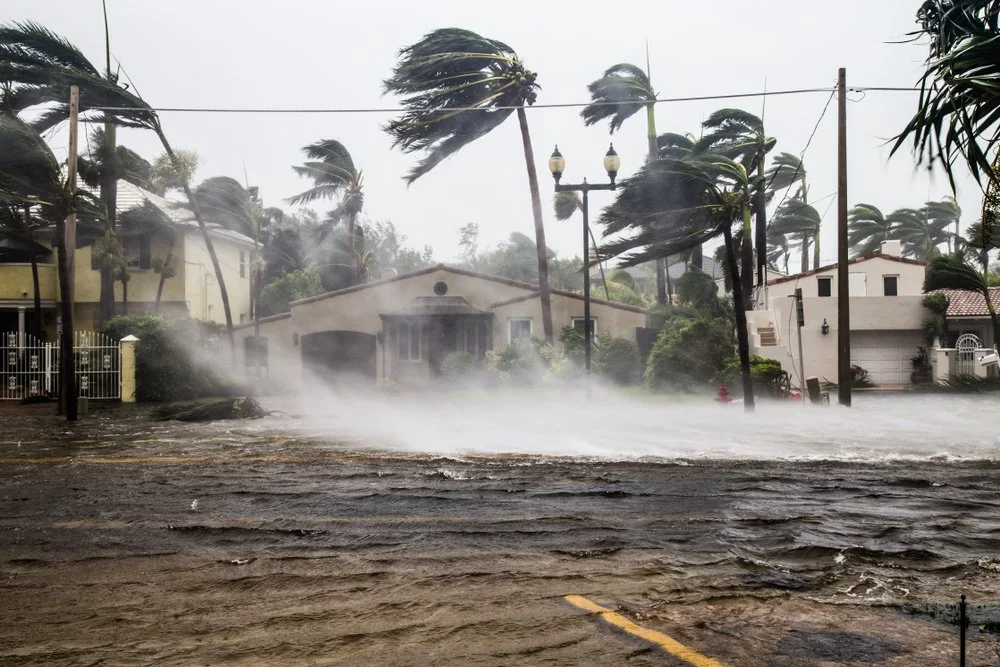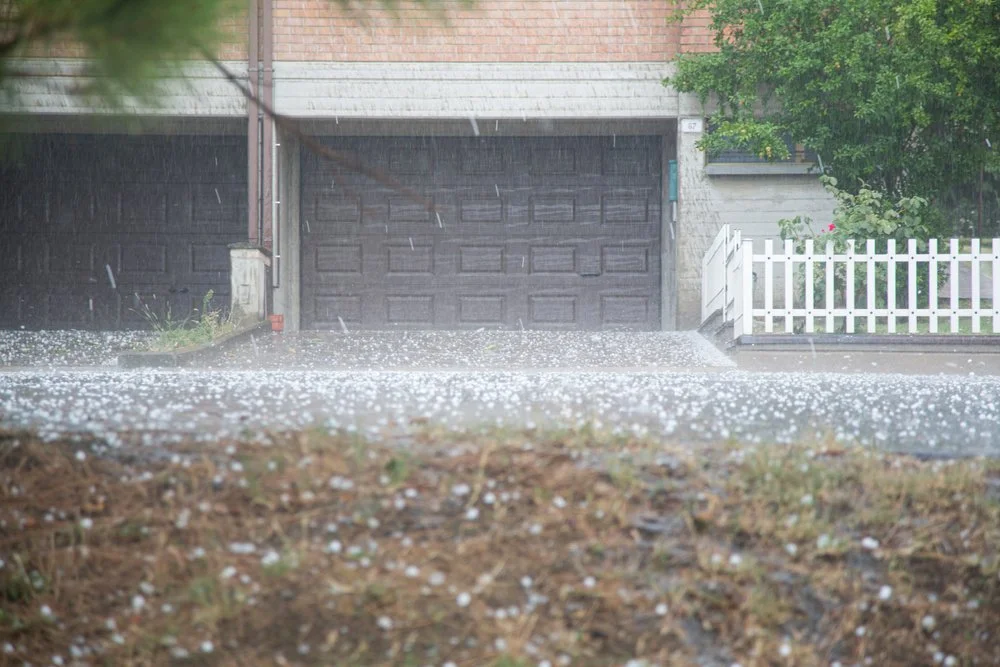Hurricane Damages and Claims: What You Need to Know
Hurricanes have been a costly component of our city’s history. Hurricane Katrina cost approximately $186.3 billion, while Hurricane Ida's property damage cost an estimated $75 billion. These storms require immense recovery efforts, both physically and emotionally.
Founded at the height of Hurricane Katrina litigation, Binegar Christian, LLC has been fighting for the rights of homeowners for over eighteen years. We advocate for fair compensation in property damage claims by standing up against insurance companies, private corporations, and federal government entities.
We know that your home is your most valuable asset . This is why we treat each and every claim as if it were our own. With the tips below, we hope to prepare you ahead of uncertain hurricane seasons.
What do I do if I have property damage after a hurricane?
Property damage after a hurricane is a deeply stressful and emotional experience. Knowing how to take action is crucial for obtaining the best outcome for recovery. Below are a few of our recommendations.
Ensure Your Safety
When a hurricane hits, you want to make sure you and your loved ones are safe. Evacuate your property if the damage poses safety risks. Find a secure location and contact local authorities if the damage poses an emergency.
Document the Damage Thoroughly
Throughout the entire process, it is important to document your damage in as much detail as possible. Documentation will become crucially important during the insurance claim process and potential legal proceedings. Keep a record of all of the following.
Photos and videos of damages (interior and exterior)
Damaged structures
Personal belongings
Valuable possessions
Communication with insurance (times, dates, names of representatives)
Expenses you incur due to the damages
Temporary housing
Meals
Transportation
Immediate repairs
Repair estimates from contractors
Note that this detailed documentation will only help to strengthen your insurance claim and legal case.
Contact Your Insurance Company
It is vital to contact your insurance company promptly. You will need to quickly report the damage to your property in order to begin the claims process. Reaching out as soon as possible can help expedite your claim.
Reduce Additional Damage
Now that you’ve documented the property damage, it’s time to mitigate your damages. . Temporary repairs help reduce additional damage. Cover exposed areas with tarps, board windows, and/or shut off utilities. Make sure you keep a record of all these temporary repairs, as your insurance company owes for these temporary repairs.
What is the process for making a claim after hurricane damage?
Filing an insurance claim is crucial for repairing and restoring your home. You will also want to act promptly, as your insurance company will be juggling an influx of claims. Navigating this process effectively can set you up for success and ensure that you receive the compensation you deserve.
Review Your Insurance Policy
Before a disaster strikes, you should understand what your insurance policy covers. However, we highly advise that you review again before making your claim. Not every insurance policy is the same. Make sure you know the following.
Types of damages covered
Limitations and exclusions
Your deductible amount
File Your Insurance Claim
When filing a hurricane damage claim, you will need to follow all deadlines and requirements. Below is a typical step-by-step process.
Contact Your Insurance Company
Once you are in a safe and secure environment, call your insurance company. Provide necessary details about your hurricane damage, such as the date of the disaster and a short description of the damages.
Complete Your Claim Forms
Your insurance company will provide you with forms to fill out to submit your claim. These forms will ask for details related to the damages and hurricane circumstances. Be as accurate as possible, as these forms are foundational to your claim.
Submit Your Claim
Along with your claim forms, you will need to provide all documentation that substantiates your claim. The strongest documentation includes:
Clear photos and videos of the damages (interior and exterior)
Inventory of all the damaged items along with their estimated value
Repair estimates from contractors
Receipts for any additional living expenses
Receipts for any temporary repairs
It is essential to provide the above documentation to ensure claim success.
Follow Deadlines
The quicker you can submit your claim, the faster you can expect to receive your compensation. Make sure you are keenly aware of your claim deadlines to get your claim processed efficiently. It shows your commitment to the process and a desire for a fast restoration.
Find an Attorney to Negotiate for You
The best-case scenario is that your insurance company approves your claim in a timely manner. However, challenges or delays may arise. An attorney with experience in litigating hurricane damage will help you fight for fair compensation.
Property damage attorneys understand the intricacies of policy terms and claim procedures. We also have experience navigating the complexities of insurance law. Legal representation is essential to help you do the following:
Understand Your Policy
A property damage attorney can review your insurance policy and explain it to you. If your insurance policy seems complicated, you’ll want an attorney in your corner to help you understand your coverage.
Adhere to Insurance Requirements
As we mentioned previously, it’s important to follow all steps and deadlines in making your insurance claim. A property damage attorney can make sure you adhere to these requirements.
Evaluate Property Damage Amount
Property damage attorneys can help you estimate the true cost of repairs and any other amounts your insurance company may owe under the policy . We’ll review all of your documentation, including estimated scope and pricing for required repairs, and ensure you do not accept an inadequate offer.
Handle Insurance Disputes
It is likely your insurance company will attempt to provide less insurance proceeds than you deserve. In this case, a property damage attorney can negotiate on your behalf. We will pursue legal action if needed. Insurance Companies also have duties and deadlines related to the handling of your claim. Many insurance companies fail to meet these obligations because they assume you do not know all of your rights under the policy and Louisiana law.
What are the types of natural disaster claims?
Hurricanes and other natural disasters can bring a host of weather events. When the elements wreak havoc on your home, it’s important to understand what types of claims exist.
We highly recommend you review your insurance policy to understand what claims are covered. You can always request that your insurance provider to extend your coverage if needed.
Wind
Types of Wind Damage
When Hurricane Ida hit Louisiana in 2021, it had 150 mph winds. These high winds have the potential to severely damage property. Strong winds can provide the following impacts on property.
Tear roof shingles, tiles, or panels.
Peel away siding, stucco, or other exterior materials.
Break windows and glass doors.
Cause walls to bow or ceilings to sag.
Project debris into windows, siding, roofs, etc.
Tear gutters and downspouts.
Uproot trees.
Knock down powerlines.
Disrupt utility services.
Cause wind-driven rain to enter your property through small, storm-created openings.
Preventing Wind Damage
Before a storm, protect your home by covering windows and glass doors, and securing any loose items in your yard. Impact-resistant glass windows and doors can also help you mitigate damage.
Wind Damage Claims
If you experience wind damage, you will need to follow the standard procedure listed above. Make sure you and your loved ones are safe and contact authorities if needed. You will want to contact your insurance company as soon as possible, offering all details related to the damage.
Take pictures and videos of the damage caused by the wind. Make an inventory list of all of the items damaged and their estimated value. You will also want to obtain a few estimates from contractors showing the potential repair cost.
Hail
Effects of Hail Damage
Hail can unleash destructive forces, causing substantial damage to properties in their path. The impacts of hail damage can be far-reaching, leading to various challenges for property owners. Here's how hail damage can manifest:
Tear and puncture roof shingles, tiles, or panels.
Expose your roof's underlying layers, causing leaks.
Strip away siding, stucco, or other exterior materials.
Crack or shatter windows and glass doors.
Cause walls to bow or ceilings to sag.
Impact windows, siding, roofs, and other exterior components.
Damage gutters and downspouts.
Snap branches and damage landscaping.
Knock down power lines, leading to power outages and safety hazards.
Disrupt utility services such as water, gas, and electricity.
Preventing Hail Damage
Prior to a storm, take precautionary measures to safeguard your property. Boarding up windows and glass doors can help protect them from hail impact. Consider investing in impact-resistant glass windows and doors, which can provide an extra layer of defense against hail damage.
Hail Damage Claims
In the unfortunate event of hail damage, prompt action is crucial. First and foremost, ensure the safety of yourself and your loved ones, and contact authorities if necessary. Immediately get in touch with your insurance company to report the damage and provide essential details.
By meticulously documenting the damage, inventorying losses, and gathering repair estimates, you can strengthen your hail damage claim and work toward securing the compensation you need for a full recovery.
Flooding
Effects of Flooding Damage
Water damage can come from a few different sources. It can come from burst pipes or internal sources, as well as overflowing rivers, rainfall, or storm surges. Knowing the difference is crucial for submitting a flood claim.
Flood damage from hurricanes can have severe consequences for homeowners and communities, leading to a range of challenges. After Hurricane Katrina, 80% of New Orleans was flooded. Flood waters can do the following:
Weaken the foundation and structure of a home.
Erode the home’s foundation, leading to structure collapse.
Ruin drywall, flooring, insulation, and electrical systems.
Create an environment for mold and mildew growth.
Damage electrical systems, HVAC units, and appliances.
Carry contaminants, sewage, and hazardous materials.
Destroy furniture, personal items, and valuable possessions.
Preventing Flood Damage
Homeowners can take extra precautions to reduce the damage caused by flooding.
Below are steps that you can take.
Elevate electrical outlets, switches, and circuit breakers.
Seal cracks, gaps, and openings in your home’s foundation.
Use temporary flood barriers and sandbags.
Flood Damage Claims
Flood insurance often comes separately from a typical homeowners insurance policy. The National Flood Insurance Program (NFIP) is the standard for flood insurance, covering damages resulting from floods.
A flood insurance claim is not handled like other damage claims . With a flood insurance claim, you are required to file a notarized Proof of Loss form within 180 days of the loss . This document allows you to detail the items damaged or lost due to the flood waters.
Other Types of Hurricane Claims
Wind, hail, and flood claims are the most common claims that homeowners make after a hurricane. However, there may be instances where you need to make additional claims.
Storm Surge Claims
Those who live along the coastline of Louisiana are especially sensitive to storm surges. When sea levels rise as a result of a hurricane, it can cause significant flooding in the region’s homes. A storm surge claim would address the damage caused by this type of flooding.
Water Damage Claims
Wind and hail have the likelihood of opening components of your home’s structure, such as your roof or windows. These openings can let a significant amount of rainwater into your home. This water can damage furniture and personal possessions. Make sure that your insurance policy covers water damage and pursue your claim as you would other types of damage.
Debris Impact Claims
Strong winds can carry objects far distances, projecting them into windows, siding, roofs, and other parts of your home’s structure. You can seek compensation for these damages, receiving payment for the replacement or repair.
Tree and Landscape Claims
Our region contains immense natural beauty. However, one of the most expensive and damaging results of a hurricane is fallen trees on the property. You can submit a claim for any repairs that fallen trees and branches have caused.
Loss of Use or Additional Living Expense Claims
If your home becomes uninhabitable after a hurricane, you must submit a claim to your insurance provider. Be sure to document all costs of temporary housing, meals, or other living expenses during the repair period.
Personal Property Claims
Our homes protect our loved ones and the items contained therein. If damage to your home’s structure causes interior damage to furniture and valuables, your insurance may cover this type of damage.
Take One Step Closer to Your Recovery
The aftermath of a hurricane can be devastating and overwhelming. The team at Binegar Christian, LLC can be your step towards recovery and peace of mind. We’ll ensure your rights as a policyholder are upheld and you receive every penny owed to you under your insurance policy
We’ll help you understand your policy, file your claim, hire experts as needed, negotiate with your insurance company, and secure the recovery you need. Maximize your claim by reaching out to Binegar Christian, LLC. It will not cost you anything unless we are successful in recovering money on your behalf, All initial consultations are free of charge.
Get a Free Consultation with Binegar Christian, LLC
Knowing the most valuable and precious asset you own is your home, we fight for each claim as if it were our own. We understand the challenges that come with property damage, insurance claims, and mortgage disputes, and we are here to help you every step of the way. Contact us today to schedule a consultation.








